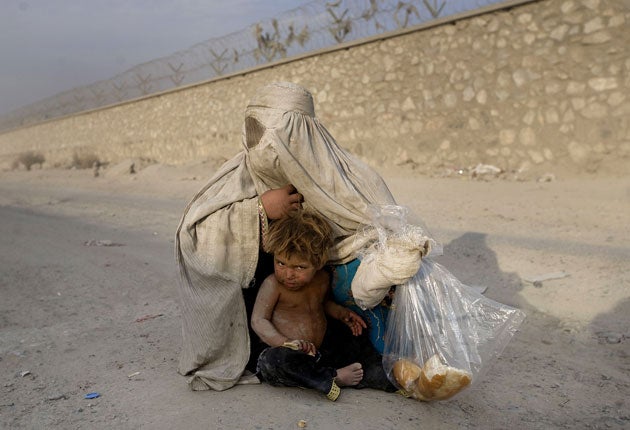The dark savagery of the Taliban years returns
When in 2001 the West welcomed the fall of the Islamist regime, few predicted that less than a decade later the ferocity would return

The opening night of a new restaurant, and the place is buzzing. The music is a mixture of rock and pop and there is no shortage of alcohol. A normal city scene, except the city is Kabul, and some of those at the party at the Martini are UN staff about to be evacuated out of the country because of the rapidly deteriorating security situation.
Out in the real Afghanistan, away from the bars and clubs, there is paralysing political crisis and extreme violence. Elections which were meant to be a showcase for how much democracy has taken root instead revealed a system rotten to the core.
Meanwhile, the war continues. In a space of 24 hours a renegade Afghan policeman slaughters five British soldiers, three US soldiers are blown up, and a Nato air strike kills a dozen people, the locals insisting they were innocent civilians.
Very few of us would have imagined when we came here in 2001, as the Taliban fell, that eight years on this country would be the centre of international focus, with the West struggling to cope with a ferocious and rejuvenated Islamist insurgency.
Afghanistan then was a nation devastated by 30 years of strife and brutality. The infrastructure was shattered, there was little power or water and commercial activity was limited to a few food shops and stores selling carpets and curios to the foreigners – the military, diplomats and the media – who had begun to arrive. There was, however, a lot of hope. The Taliban had fled, the private armies of the warlords were due to be disbanded and Hamid Karzai seemed the right man to unify the country and heal sectarian wounds. The Afghan diaspora was returning home, some of them among the best and the brightest, to rebuild the nation.
Women were emerging from the shadows after decades of oppressive segregation. One could drive to Kandahar, the spiritual home of the Islamists, on roads which were bone- crunching but relatively safe, to see females of all ages throwing off the veil. But there were already moves taking place that would have catastrophic consequences. Osama bin Laden and a hardcore of his fighters were allowed to escape from Tora Bora. Pakistan's secret police, the ISI, gave them sanctuary across the border, as they were to do to Mullah Omar, the one-eyed Taliban leader, and his followers. The Americans, instead of curbing the power of the warlords, turned them into allies. They, in turn, kept their forces and used Nato to eliminate tribal rivals by denouncing them as insurgents.
Kabul was the wild east at the time, attracting all kinds of fortune hunters and mercenaries. Afghanistan was left to such men, and their Afghan counterparts, and the international focus moved on. Into this vacuum came back the Taliban, trained and armed by their Pakistani ISI masters. I returned to Afghanistan in 2003 to find that attacks had begun on Afghan and foreign forces, thousands of refugees who had returned from Pakistan and Iran were still in their camps living in appalling conditions, and the one commercial activity prospering was bribery.
Major British involvement began in 2006 when the Helmand deployment began with the then defence secretary John Reid hoping that "not a shot would be fired in anger".
I accompanied a redoubtable British officer, Lt-Col Henry Worsley, to several shuras – local gatherings – around Helmand with minimal security measures. The complaints were the same, it was about the lack of development, of jobs. "What happened to all the promises made by the US and Britain?" they asked.
There were, however, few signs then of an insurgency. The main concern of British troops at the time was the poppy eradication programme. That summer British troops, against the wishes of General Sir David Richards, the British officer commanding Nato forces, went charging off to fight the Taliban in outlying areas. The insurgency had begun and its flames spread rapidly. Helmand was the focus of media attention and in half dozen visits one could see the futility of fighting a campaign with inadequate resources. In operation after operation, territory taken by British troops, often at cost of lives and limbs, had to be abandoned because of lack of boots on the ground.
Afghanistan was slipping back to its dark past. The precious freedom gained for women was being clawed back. Of five women I interviewed after the fall of the Taliban, three were murdered and the fourth Zarghuna Kakar, then MP for Kandahar, had to flee after the Taliban killed her husband and injured her daughter in an ambush.
Join our commenting forum
Join thought-provoking conversations, follow other Independent readers and see their replies
Comments